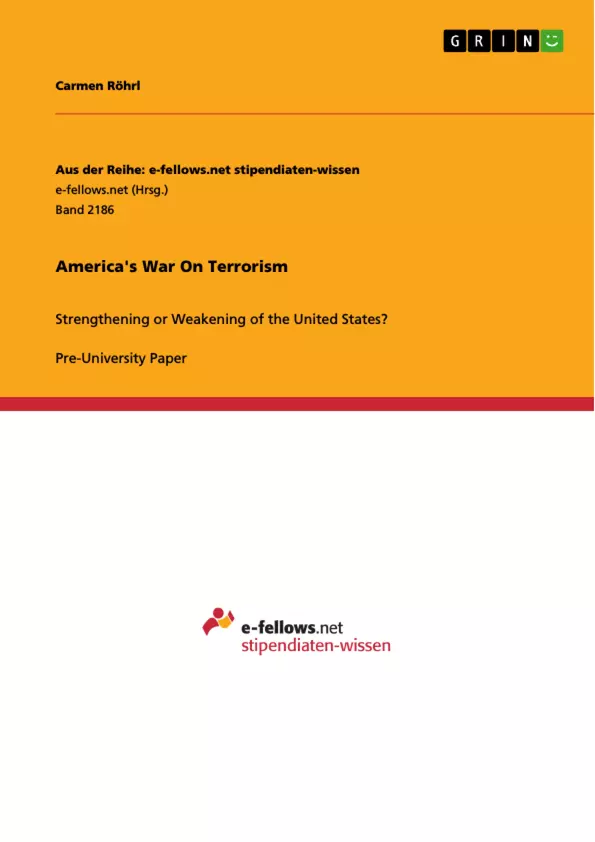This term paper gives a short overview on the War on Terrorism, on how it has developed and what successes were achieved as well as what sacrifices had to be made.
How did it affect America’s position as the world's leading superpower? Did it strengthen it? Weaken it? Ruin it? Are the United States still a world power?
“I can hear you. The rest of the world hears you. And the people who knocked these buildings down will hear from all of us soon.”
- President George W. Bush, Ground Zero, September 14th, 2001.
Inhaltsverzeichnis (Table of Contents)
- Introduction
- Terminological and definitional fundamentals
- The term "War on Terror"
- The term "Terrorism"
- The term "Jihad"
- Taliban and Al-Qaeda
- Development of the war on terror
- Reasons for fighting terrorism
- Aims of terroristic groups
- Terroristic assaults on the United States
- Danger of further attacks
- Starting the war on terror
- Progression of the war on terror
- Authorization for Use of Military Force Against Terrorists and "Bush Doctrine"
- Military Action
- Reasons for fighting terrorism
- Successes of the war on terror
- Deaths of important terror group leaders
- Achievement of aims and withdrawal of troops
- Deterrence of the terrorists
- Improvement of America's reputation
- Sacrifices of the war on terror
- Costs of the operations
- Deaths caused by the war on terror and impact on civilians' lives
- Aggravation of America's reputation
- New threats on the rise
- Conclusion
Zielsetzung und Themenschwerpunkte (Objectives and Key Themes)
This term paper examines the impact of America's "War on Terror" on its position as a leading superpower. It investigates whether the war strengthened, weakened, or ruined America's role in the world. The paper will explore the origins, progression, successes, and sacrifices associated with the war on terror.
- The definition and implications of the term "War on Terror"
- The roots of terrorism and the motivations of terrorist groups
- The impact of the war on terror on American domestic and foreign policy
- The successes and failures of the war on terror in achieving its stated goals
- The long-term consequences of the war on terror for both the United States and the world
Zusammenfassung der Kapitel (Chapter Summaries)
- Introduction: This chapter establishes the context of the term paper, introducing the "War on Terror" as a response to the September 11th attacks and raising the central question of whether the war strengthened or weakened America's position as a superpower.
- Terminological and definitional fundamentals: This chapter defines key terms such as "War on Terror", "Terrorism", and "Jihad" to establish a common ground for understanding the subject matter. It also discusses the historical context of these terms and their relationship to the conflict.
- Development of the war on terror: This section analyzes the reasons behind the war on terror, exploring the motives of terrorist groups, the impact of the 9/11 attacks, and the perceived danger of further attacks. It then delves into the progression of the war, discussing the "Authorization for Use of Military Force Against Terrorists" and the "Bush Doctrine".
- Successes of the war on terror: This chapter examines the successes achieved in the war on terror, such as the deaths of key terrorist leaders, the achievement of strategic objectives, and the deterrence of future attacks. It also evaluates the impact of the war on America's global reputation.
- Sacrifices of the war on terror: This chapter explores the costs and sacrifices incurred by the United States in the war on terror, including the financial costs of military operations, the human toll in terms of civilian casualties, and the negative impact on America's reputation in some regions. It also discusses the emergence of new threats and challenges related to the war on terror.
Schlüsselwörter (Keywords)
The key terms and concepts explored in this term paper include: War on Terror, terrorism, Jihad, Taliban, Al-Qaeda, September 11th attacks, Bush Doctrine, Authorization for Use of Military Force Against Terrorists, global superpower, foreign policy, military strategy, cost of war, civilian casualties, and international relations.
Frequently Asked Questions: America's War on Terrorism
What is the "War on Terror"?
The "War on Terror" refers to the international military campaign launched by the United States following the September 11, 2001, attacks, aimed at dismantling terrorist groups like Al-Qaeda and the Taliban.
What is the "Bush Doctrine"?
The Bush Doctrine describes several related foreign policy principles, including the policy of preemptive strikes against perceived threats and the pursuit of regime change in nations harboring terrorists.
What were the main successes of the War on Terror?
Key successes include the deaths of high-ranking terrorist leaders, the disruption of major terror networks, and the deterrence of large-scale attacks on U.S. soil for many years.
What were the sacrifices and costs associated with the war?
The sacrifices include trillions of dollars in military spending, significant loss of life among military personnel and civilians, and a complex impact on America's global reputation.
How did the war affect America's position as a superpower?
The war demonstrated U.S. military might but also led to long-term geopolitical challenges and debates about the limits of military intervention in the 21st century.
- Quote paper
- Carmen Röhrl (Author), 2014, America's War On Terrorism, Munich, GRIN Verlag, https://www.grin.com/document/343285



